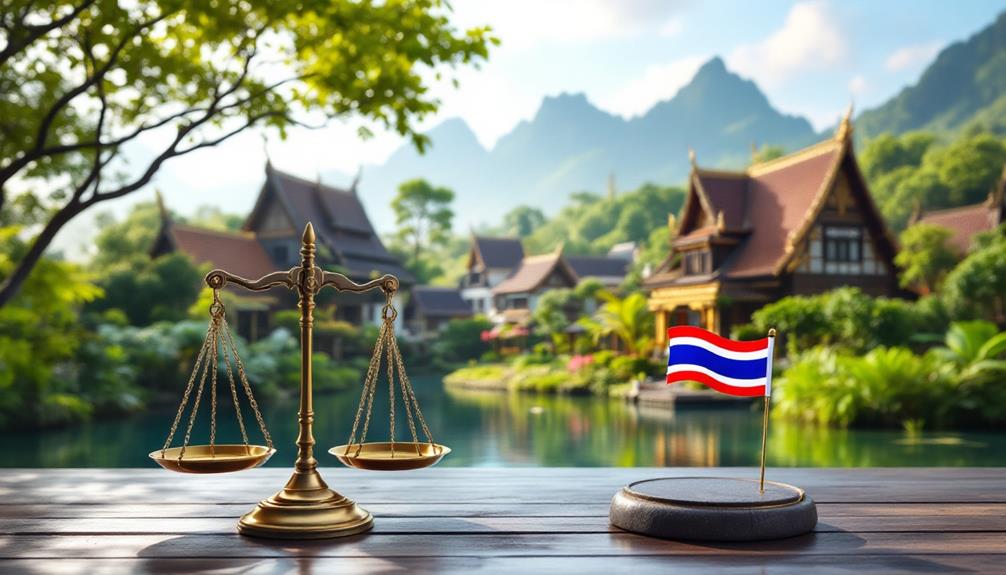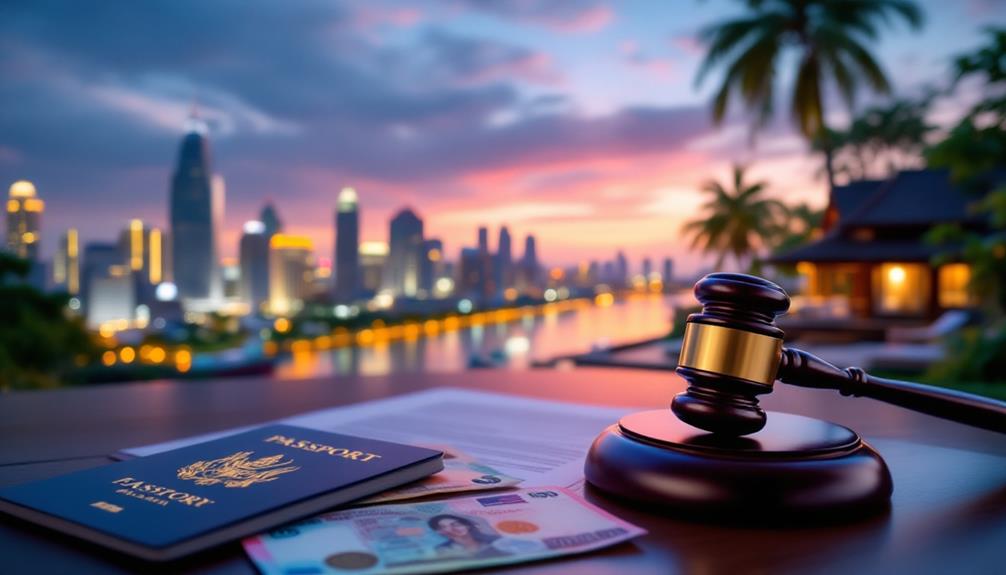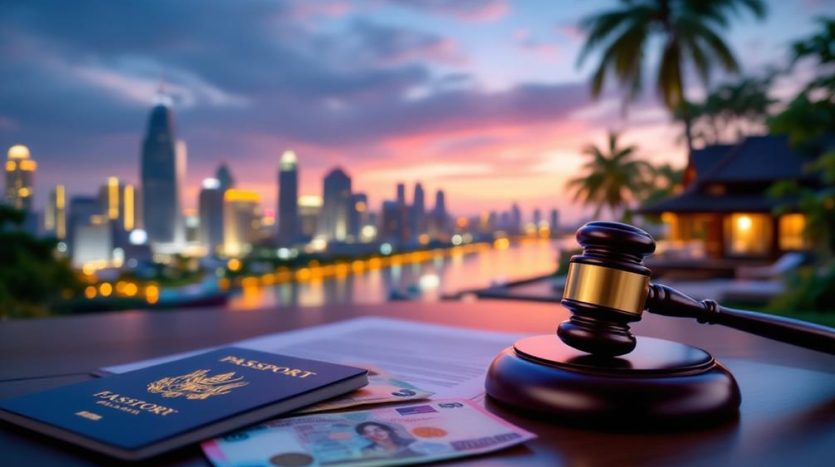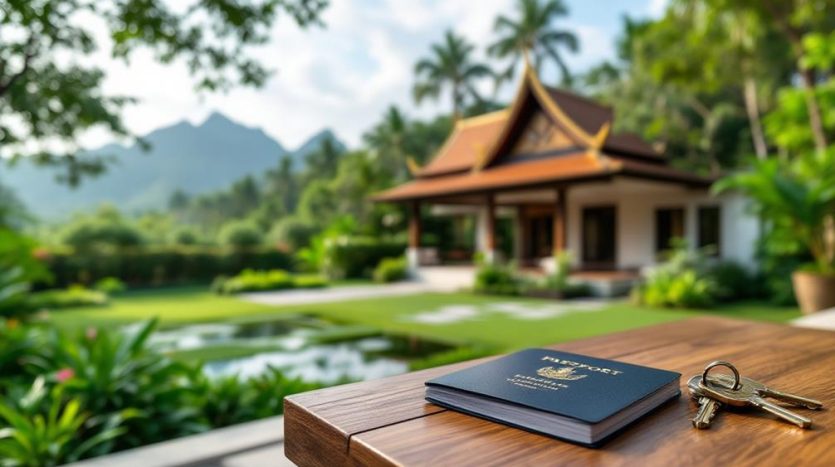Can a US Citizen Buy a House in Thailand?
You might think it's impossible for a U.S. citizen to buy a house in Thailand, but there are ways to navigate the country's foreign ownership restrictions. While you can't directly own land, options like long-term leasehold agreements or purchasing a condominium are worth exploring. Establishing a Thai company or using nominee structures can also facilitate property acquisition. However, these routes come with their own legal complexities. So, how do you guarantee compliance with Thai property laws and make a sound investment? There's much to contemplate before taking the plunge into the Thai real estate market.
Key Takeaways
- U.S. citizens cannot directly own land in Thailand but can own condominiums under the 49% foreign ownership limit.
- Foreigners can lease land for up to 30 years with renewal options, allowing them to own buildings on the land.
- Establishing a Thai company is a potential way for U.S. citizens to indirectly own property, though complex regulations apply.
- Legal structures like nominee arrangements may facilitate ownership, but compliance with Thai laws is crucial.
- Engaging local experts and conducting due diligence are essential for navigating Thailand's complex property laws.
Understanding Thai Property Laws

When it comes to maneuvering through Thai property laws, it's vital to understand that foreigners, including US citizens, face specific restrictions. For instance, foreign ownership is limited to 49% of the total floor area in condominium buildings, as per the Condominium Act of 1979.
But don't let that scare you away from a good property investment opportunity. Think of it as an adventurous game of Monopoly where the rules are slightly different, but with the right strategy, you can still build hotels on Boardwalk—or, in this case, a dream villa in Phuket.
The key is legal compliance, which sounds about as exciting as watching paint dry, but it's absolutely necessary. You're not just buying a property; you're ensuring a smooth, headache-free investment.
Thai laws are like that quirky friend who insists on wearing mismatched socks—not everything makes sense at first glance, but there's a method to the madness.
Foreign Ownership Restrictions
When considering property investment in Thailand, you need to understand the limitations on foreign land ownership.
While you can't directly own land, purchasing a condominium under certain conditions is an attractive option.
Additionally, foreigners can rent property by following local rental laws, which may include securing a Non-Immigrant Visa.
Alternatively, you can secure a long-term leasehold agreement to enjoy property rights without outright ownership.
Land Ownership Limitations
Maneuvering the real estate market in Thailand can be challenging for foreign investors due to stringent land ownership limitations. The quest for that perfect Thai paradise often hits a wall when it comes to land tenure and property rights.
You might wonder, "Why does my dream villa need to come with a side of loopholes?" Well, it's because Thailand doesn't allow foreign nationals to own land outright. But don't pack up your flip-flops just yet!
Let's break down the hurdles you'll face:
- Land Tenure: The legal frameworks are as complex as a Pad Thai recipe, and foreigners are restricted from owning land directly.
- Property Rights: While you can own buildings and structures, the land beneath them must be leased, typically for up to 30 years, but can be renewed.
- Legal Entities: Establishing a Thai company might sound like a good workaround, but it requires you to jump through more hoops than a circus poodle.
Condominium Purchase Options
While traversing Thailand's real estate market, you might find that condominiums offer a more straightforward path for foreign ownership. Now, don't pop the champagne just yet, because there are a few hoops to jump through. But fret not, they're not flaming hoops—more like hula hoops.
As a foreigner, you're legally allowed to own up to 49% of the total area of all units in a condominium building. It's like being part of an exclusive club, but without the secret handshake.
The investment potential here is as spicy as a bowl of Tom Yum. With Thailand's market trends showing steady growth, especially in bustling areas like Bangkok and Phuket, buying a condo could be your ticket to a solid return on investment.
Just imagine sipping cocktails on your own balcony while your property appreciates in value.
To make it more client-oriented, you'd want to keep an eye on these market trends and act swiftly. Think of it as catching a tuk-tuk during rush hour—timing is everything.
Leasehold Agreement Details
For those eyeing Thailand's real estate with foreign ownership in mind, understanding leasehold agreements is essential.
Let's face it, maneuvering through Thai property laws can be as tricky as pronouncing Pad Thai properly. But fear not, as leasehold agreements offer a viable path for you to own a slice of paradise.
Here's the scoop:
- Lease Duration: Typically, a lease term lasts up to 30 years. That's the same amount of time it takes to get through Bangkok traffic on a Monday.
- Renewal Options: You may negotiate renewal options for an additional 30 years, giving you plenty of time to work on your Thai language skills. Just make certain these are clearly stated in the contract to avoid any hiccups.
- Legal Advice: Always have a savvy lawyer by your side. Think of them as your property-owning sherpa, maneuvering through the mountainous legal terrain.
While the leasehold route doesn't grant outright ownership, it provides a stable foothold in Thailand's real estate market.
Purchasing Condominiums

When considering purchasing a condominium in Thailand as a US citizen, you'll find that the regulations are more straightforward compared to buying a house.
This is especially true in urban areas like Bangkok, where demand is high and there are numerous modern apartments catering to urban dwellers.
Foreign ownership is permitted up to 49% of the building's total units, making it a viable investment opportunity.
To guarantee a smooth transaction, prepare the required legal documentation, including proof of funds transferred from abroad and compliance with the Thai Condominium Act.
Foreign Ownership Regulations
Purchasing a condominium in Thailand as a foreigner can be an attractive investment opportunity due to the country's supportive foreign ownership regulations.
Imagine sipping a coconut on your condo balcony, knowing you've made a savvy property investment in a land where the sun is as consistent as the friendly smiles.
But, before you plunge in, let's unpack what these regulations mean for you.
Thailand allows foreigners to own up to 49% of a condominium's total space. This might sound like a math challenge, but it's actually quite straightforward.
You get the same ownership rights as a local, minus the head-scratching cultural differences that come with buying land.
Here's what makes this prospect even sweeter:
- Legal Simplicity: No need to twist yourself into a pretzel of paperwork.
- Market Appeal: Thailand's growing tourism sector bolsters rental demand.
- Resale Value: Tropical paradise never goes out of style.
Required Legal Documentation
Before diving into the exciting world of condominium ownership in Thailand, you'll need to wrap your head around the essential legal documentation required for a smooth transaction.
First things first: obtaining the property title. Think of it as the golden ticket to your new tropical abode. Make sure the title is in your name and verify it with the local Land Office. This document proves ownership and is your passport to Thai condo life.
Next, conduct due diligence with the precision of a detective on a high-stakes mission. Scrutinize the property's legal standing, confirm that it's not entangled in legal disputes, and verify ownership history. You don't want to discover that your dream condo is caught in a tangle of red tape, do you?
Also, check that you're purchasing from a reputable developer. If they don't have a track record, it might be time to channel your inner Sherlock Holmes.
Lastly, prepare a Sales and Purchase Agreement. Get a legal eagle to review it, making sure it's as watertight as your future beachfront condo.
With these documents in hand, you're ready to embrace the Thai condo lifestyle!
Leasehold Agreements
Maneuvering the real estate landscape in Thailand, leasehold agreements present a viable option for foreign buyers, including U.S. citizens. You mightn't be able to own land outright due to Thai laws, but a leasehold agreement can secure your dream home for a solid chunk of time.
Typically, these agreements offer a lease duration of 30 years, which might just outlast your favorite pair of socks. Additionally, affordable housing compared to major Western cities makes this option even more attractive.
But don't worry, because renewal options can extend this term up to 90 years with a couple of strategic signings.
Here's why you should consider a leasehold:
- Flexible Lease Duration: Start with 30 years and extend up to 90. That's longer than some marriages!
- Renewal Options: Keep your options open; renew and stay as long as you want.
- Investment Potential: Leaseholds can yield healthy returns if you decide to rent it out when you're not there sipping coconut water.
Setting Up a Thai Company

Venturing into the Thai real estate market through setting up a Thai company offers a strategic pathway for U.S. citizens to acquire property.
Now, before you imagine yourself as the next real estate mogul in Bangkok, there are a few things to keep in mind. First, you'll need to tackle business registration, which is as important as remembering to pack sunscreen for your beach getaway. This involves registering your company with the Thai Ministry of Commerce—think of it as getting your official backstage pass to the property market.
While setting up a Thai company might sound like a scene from a business thriller, it's vital to reflect on the tax implications. You wouldn't want to be that person who gets a surprise tax bill as a housewarming gift! Steering through Thailand's tax mazes requires a good accountant—someone who can dance gracefully with numbers and keep Uncle Sam happy across the ocean.
In a nutshell, setting up a Thai company isn't just about signing papers and popping champagne. It's about strategic planning, ensuring your property dreams align with legal frameworks, and keeping your financial ducks in a row.
Using Nominee Structures
Maneuvering the intricacies of the Thai real estate market can sometimes involve using nominee structures as a method for U.S. citizens to purchase property.
Yes, you heard that right—navigating the maze of property investment in Thailand might feel like a high-stakes game of Monopoly. But, with a bit of strategy, you can make your dream home a reality.
Nominee agreements are often employed to sidestep restrictions on foreign ownership. Here's what you need to know before you plunge into:
- Ownership Illusions: Nominee agreements make you feel like you own the property, but on paper, it's someone else's name. It's like having a ghost tenant!
- Legal Tightrope: Walking the line of legality can be tricky. You'll need to guarantee that your nominee structure is as solid as your favorite pair of flip-flops.
- Market Savvy: Understanding the market and nominee agreements can give you an edge, turning you from a property amateur into a real estate tycoon.
Legal and Financial Considerations

When it comes to buying property in Thailand, especially as a U.S. citizen, there are legal and financial considerations you can't afford to overlook.
First, let's tackle the elephant in the room: tax implications. The IRS won't forget about you just because you're sipping coconut water on a Thai beach. You'll need to report any foreign property and income, and it's wise to consult a tax advisor who knows their way around both Thai and U.S. tax codes. That way, you won't end up with a tax bill that feels like a tsunami.
Next, financing options. If you thought getting a mortgage in New York was tough, wait until you try it in Bangkok. Thai banks aren't exactly rolling out the red carpet for foreign buyers, so you might need to explore financing through international banks or even consider using your home equity from the States.
Remember, cash is king—if you can buy outright, you'll dodge a lot of headaches.
In the end, while the idea of owning a slice of paradise is tempting, make sure your legal ducks are in a row. Otherwise, you might find yourself in hot water, and we're not talking about the spa.
Steps to Buying Property
Once you've navigated the legal and financial maze, it's time to focus on the practical steps of buying property in Thailand. First, you need to identify the right property that aligns with your investment goals and the latest market trends.
Don't be the person who buys a beach hut only to realize it's in a flood zone during monsoon season! Instead, do your homework and guarantee the property is in a desirable location with potential for appreciation.
Next, engage a reputable real estate agent who understands the intricacies of the Thai market and can guide you through the process. Think of them as your real estate fairy godparent, minus the wand.
They'll help you avoid pitfalls and navigate the cultural nuances of property investment in Thailand.
Finally, conduct a thorough due diligence. This involves checking the property's legal status, verifying land titles, and guaranteeing there are no unexpected surprises lurking, like hidden liens or ownership disputes.
- Research the market thoroughly: Know the trends and hotspots.
- Hire a trusted real estate agent: They're worth their weight in gold.
- Conduct due diligence: Verify everything before signing on the dotted line.
Tips for US Buyers

For US buyers looking to invest in Thailand's real estate market, understanding the landscape is essential. Imagine trying to buy a house in a foreign land, only to discover that your dream home comes with a ghost or two—of the legal variety. Worry not, because traversing Thailand's real estate scene can be as breezy as a beach day in Phuket, provided you've got the right tips.
First up, embrace the cultural differences. Unlike in the US, where a firm handshake seals the deal, in Thailand, patience is key. Deals may take time, and a smile goes a long way. Your real estate agent might just become your new best friend, guiding you through the do's and don'ts.
Then, there's property maintenance. Tropical paradise means lush landscapes and relentless humidity—perfect for mold and critters. Regular maintenance is a must, so budget for it. Think of it as keeping your investment as fresh as your coconut water.
Lastly, keep your eye on the legal ball. Consult with local experts to guarantee compliance with Thai property laws. After all, you wouldn't want your real estate adventure to turn into a legal thriller!









